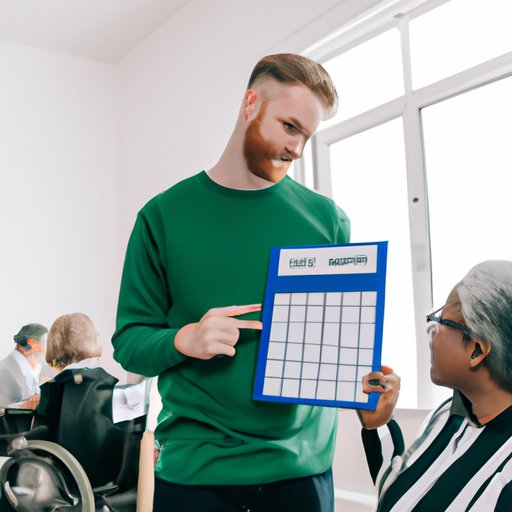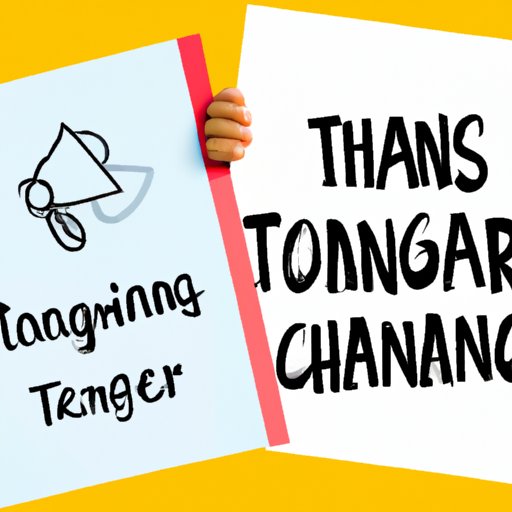
Introduction
Learning disabilities are a common condition that affect millions of individuals across the world. They can make it challenging for people to understand, learn, and communicate information effectively. The importance of identifying and understanding learning disabilities cannot be overstated. With appropriate interventions, people with learning disabilities can achieve academic and professional success. In this article, we will explore the signs, symptoms, and resources available to individuals who wonder, “Do I have a learning disability?”
Understanding the Signs and Symptoms of Learning Disabilities
A learning disability is a neurological disorder that affects the way people process information and learn. Individuals with learning disabilities have average or above-average intelligence, but they struggle with one or more areas of learning. The most common areas of difficulty include reading, writing, math, and communication skills. It is important to learn the signs and symptoms of learning disabilities to seek professional help and a proper diagnosis.
Some common signs and symptoms of learning disabilities include:
Difficulty With Reading, Writing, and/or Math
Individuals with learning disabilities may struggle with reading comprehension, spelling, and grammar. They may also have difficulty with basic math concepts like arithmetic, fractions, and telling time. These struggles can have a significant impact on academic and professional success.
Problems With Memory and/or Attention
People with learning disabilities may have trouble retaining information, especially if it is presented verbally. They may also have difficulties with attention and concentration which can result in a lack of focus on tasks, disorganization, and poor time management.
Struggles With Organization and Time Management
Individuals with learning disabilities may experience difficulties with organization and time management. They may struggle with planning and carrying out tasks, completing assignments, and managing their time effectively.
It is essential to seek professional help from a medical or educational specialist to get a proper diagnosis if you are experiencing any of these symptoms. Professionals will assess your strengths and weaknesses in learning and assign an appropriate intervention plan to assist in your academic and professional goals.
A Comprehensive Checklist: How to Tell If You Have a Learning Disability
If you are wondering if you have a learning disability, a thorough examination by a professional is necessary. However, you can use a self-assessment checklist to identify symptoms of potential learning disabilities. The checklist below describes some of the most common learning disabilities and includes a brief explanation of each.
Attention Deficit Hyperactivity Disorder (ADHD)
Attention Deficit Hyperactivity Disorder (ADHD) affects attention, impulsivity, and hyperactivity. Symptoms may include difficulty with focus, impulsive behavior, difficulty following instructions, and inability to sit still.
Dyslexia
Dyslexia primarily affects reading and writing skills. Symptoms of dyslexia may include difficulty with reading comprehension, trouble sounding out words, and challenges with spelling.
Dysgraphia
Dysgraphia affects writing skills. Symptoms may include an inability to write properly, messy or unorganized writing, trouble with grammar and spelling, and gripping a pencil or pen.
Dyscalculia
Dyscalculia affects math skills. Symptoms may include challenges with counting, spatial reasoning, understanding math concepts, and difficulty with problem-solving.
Non-Verbal Learning Disabilities (NVLD)
Non-Verbal Learning Disabilities (NVLD) primarily affect social skills, including communicating and interpreting nonverbal cues such as body language, facial expression, and tone of voice.
Once you have identified a potential learning disability, the next step is to seek professional help. Whether you are in school, the workforce, or coping with the disability at home, there are accommodations to help combat areas in which you struggle.
Navigating Life with a Learning Disability: Tips and Resources
Living with a learning disability can present challenges, but with the right tools, resources, and support, individuals with learning disabilities can lead fulfilling and successful lives.
Here are some tips for managing day-to-day life with a learning disability:
-Create a routine and follow it regularly.
-Break large tasks into smaller, more manageable tasks.
-Use technology and tools designed for people with learning disabilities.
-Create an environment conducive for learning, meaning a quiet space, limited distractions, and proper lighting.
-Identify and use resources that are available for individuals with learning disabilities.
There are numerous resources and tools available to individuals with learning disabilities. These resources include educational therapists, specialized tutors, and assistive technology, which can help level the playing field with academic education or daily tasks.
Individuals with learning disabilities have legal rights under the Americans with Disabilities Act. This law provides protection against discrimination in education, employment, and housing. If you have a learning disability, it is essential to understand and appreciate your rights.

The Importance of Early Detection: Identifying Learning Disabilities in Children
Learning disabilities can manifest in children as early as preschool age. Some signs of potential learning disabilities in children include difficulty understanding basic instructions, limited sentence structure, struggles with memorization, difficulty with fine motor skills, and unable to recognize shapes, numbers, and letters.
Early intervention is critical for children with learning disabilities. It is advisable to consult with a pediatrician or a special education teacher if you suspect a child may have a learning disability. Appropriate interventions help children to develop much-needed skills early in life, which, in turn, assist them in succeeding academically and later in life.
Overcoming Stigma: Speaking Up About Learning Disabilities
Stigma associated with learning disabilities is common. Society often assumes that individuals with learning disabilities have lower intelligence, lack motivation, or are “lazy”. However, nothing could be further from the truth. Many people with learning disabilities have above-average intelligence and an extraordinary willingness to learn, but they often require unique and specialized educational supports to help them reach their full potential.
Breaking down stereotypes and overcoming stigma is vital. Individuals with learning disabilities are a diverse group of people, and there is no “one size fits all” solution to their unique challenges. It is essential to listen to and support individuals with learning disabilities to help them achieve their goals.
The Intersection of Learning Disabilities and Mental Health
Individuals with learning disabilities often experience significant emotional and psychological impact. The challenges that come with a learning disability can cause anxiety, depression, low self-esteem, and other mental health challenges.
There are several resources and supports available to individuals dealing with mental health challenges, including counseling services, support groups, and therapy. Understanding the potential mental health impact of learning disabilities and seeking appropriate support is the first step to developing a healthy, productive lifestyle.
Empowering Yourself: Finding Support for Learning Disabilities
Finding support for learning disabilities is vital to achieving academic and professional success. It is essential to seek help from supportive individuals and professionals who can assist in identifying strategies for success. Some people with learning disabilities find individual advocacy groups or support networks of like-minded individuals who overall aid in building a strong, supportive community.
Self-advocacy is another powerful resource. Being informed about legal rights, having access to appropriate accommodations, and developing coping mechanisms based on the individual’s unique learning needs.
Conclusion
Do I have a learning disability? It is entirely normal to question if a learning disability exists within oneself. If that is the case, it is vital to seek professional help for a proper diagnosis of Learning Disabilities. Learning disabilities do not define who we are. With appropriate interventions, resources, and supports, individuals with learning disabilities can achieve academic and professional success. The key is to seek out the shared experiences of other individuals with learning disabilities, listen to their advice, and build a community with like-minded individuals. Let us break down barriers, prejudices, and stereotypes regarding learning disabilities. Together, let us advocate for greater understanding, inclusion, and support for those with learning disabilities.





